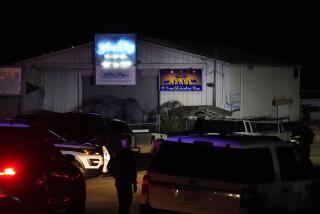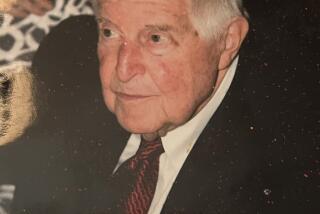Werner Gramckow dies at 95; sod grower turned Southland suburbs green
Werner Gramckow, an immigrant from Germany who settled in Ventura County after World War II and became one of the largest growers of sod for suburban lawns throughout Southern California, has died. He was 95.
Gramckow’s death in an Ojai rest home on New Year’s Day was caused by complications from old age, his son Jurgen Gramckow said.
When Gramckow and his young family arrived in California in 1950, he was a bookkeeper who had been diverted from a business career by conscription into the German army and service on the brutal Russian front.
He had a nest egg that consisted of two Leica cameras. He was a city boy who knew nothing about farming and had no particular views on lawn care. But when he get off a plane from New York on a baking, brown August day in Burbank, his reaction, as he recalled it in a 2011 memoir, was prophetic.
“‘What the hell is this,’ I muttered to myself. ‘So, this is a desert. Everything bone dry.’
“The three of us stood side by side, utterly agape,” he wrote.
Gramckow went on to found a company with his son Jurgen that developed a kind of grass particularly suited to the high heat and low moisture of Southern California. By the time he retired in 1990, the firm was greening subdivision after subdivision, ultimately laying a carpet of its trademark Marathon sod outside as many as 75,000 homes a year.
Born Oct. 22, 1919, in Hamburg, Germany, Gramckow spent six years in Hitler’s army, surviving the horrific Battle of Stalingrad. After the war, he was an interpreter for British forces in Germany and worked for the United Nations, helping refugees to resettle.
In the U.S., he headed for Ventura, where his older brother Hans had made his home. Gramckow became a bookkeeper for a citrus packer and took accounting classes at UCLA. He finally got his big break when a German American friend, Toby Grether, started raising sod for the booming housing industry in 1960.
The new concept of selling instant lawn perplexed Gramckow but he soon became a true believer.
“I seemed to have a knack for it,” he wrote. “I went door-to-door at first, joined landscaper associations, attended events, bought drinks, and listened to what the landscapers wanted.”
By then, though, his friend was disenchanted and figured ready-made landscaping would never really replace ordinary seeds, long as they may take to sprout.
“It’s a luxury item,” Grether concluded. “It won’t last.”
Gramckow, who described himself as a “realistic workhorse,” stuck with it, overcoming his wife Gertrud’s objections that he was risking everything in order to buy a truck and lease 50 acres on the Oxnard Plain.
With his son Jurgen, a fresh Stanford engineering graduate, he started a turf wholesaling operation called Pacific Sod Farm in 1970. After corporate rifts triggered by disagreements between Gramckow and his investors, father and son started Southland Sod Farms in 1976. Southland ultimately farmed 1,200 acres.
Battered by recession, drought and increased competition, the company rebounded when it introduced Marathon, a tall fescue with deep roots, in 1983. Originated by an Oregon grower, it “became the standard for Southern California lawns,” Gramckow wrote.
In 1990, he retired. He later met his second wife Gail and moved to Indian Wells, a resort community 20 miles southeast of Palm Springs. His marriage to Gertrud ended in divorce.
In addition to son Jurgen, Gramckow’s survivors include his son Martin, also an executive at Southland Sod; daughter Heidi Bradbury; and eight grandchildren.
Twitter: @schawkins
More to Read
Start your day right
Sign up for Essential California for the L.A. Times biggest news, features and recommendations in your inbox six days a week.
You may occasionally receive promotional content from the Los Angeles Times.







